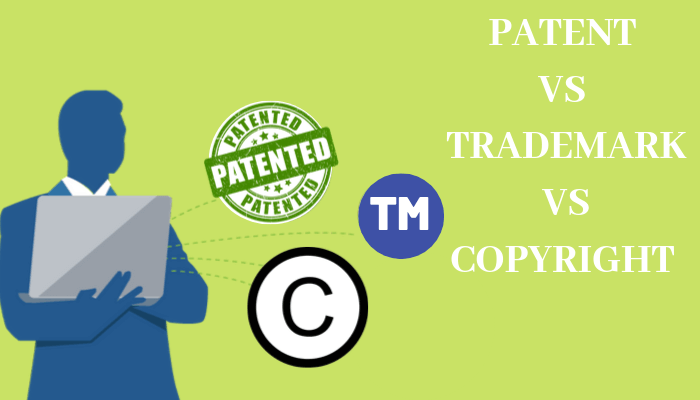All kinds of Patent, copyright, and trademark are intellectual property rights in which the creator gets an exclusive right to use such intellectual property. Those Entrepreneurs who want to register their intellectual property, they must know the differences between the Patent, copyright, and trademark and have the knowledge of right registrations to protect his/her intellectual property. In this article, we will understand the meaning and the differences between patent, copyright, and trademark in India.

In this article, we will discuss about...
What is a Patent?
It is an exclusive right for an invention, made by an entrepreneur, provided by the law for a limited time to the Patentee. By patenting an invention, the patentee shall be able to control the making, using, selling or importing of the invention for producing that product without his/her consent.
What is Copyright?
It is a right given to creators by the law of dramatic, literary, musical and artistic works and producers of cinematograph films. Therefore, copyright is mainly used to protect the creativity of writers, designers, artists, musicians, dramatists, sound recordings, architects and producers of, cinematograph films. Copyright does not protect names or brands, short word combinations, short phrases, slogans, methods, plots or factual information. It also does not protect concepts or ideas.
What is a Trademark?
It is a symbol which can be seen as a word by signature or name or device or label or numerals or combination of colors used by one Enterprise on goods or services which can be distinguished from other similar goods or services producing from the different undertaking. Hence, trademarks are normally used for protecting business names, brand names, slogans, etc.
Difference between Patent, Copyright, and Trademark
The Patent, Copyright, and Trademark are used for different purposes. The validity of life and requirement of this intellectual property for the application can vary as follows:
Main purpose for which these Intellectual properties would be used
Patent: Mainly, it is used for securing invention relating to any product or process which is new and which is capable of having industrial application.
In the following inclusive list, those items have been specified which would NOT be treated as patentable in India as per Section 3 of the Patent Act, 1970:
- A method related to agriculture or horticulture
- Plants and animals except for microorganisms but including seeds, varieties and species biological processes for the production of plants and animals;
- An invention which is frivolous or which can claim anything obviously contrary to well established natural laws;
- An invention which is primary or whose intended use or commercial exploitation could be contrary to public order or morality or which may cause serious prejudice to human, animal or plant life;
- The only discovery of a scientific principle or discovery of any living thing or non-living substance occurring in nature or the formulation of an abstract theory;
- If there is only an arrangement or re-arrangement or duplication of already known devices each which are functioning independently of one another in a known way;
- A business or mathematical method;
- A mere rule or scheme or method of playing game or method of performing the mental act;
- A presentation of information;
- An invention which in effect, which is an aggregation or traditional knowledge or duplication of known properties of known components.
Copyright: It is mainly used to secure literary, dramatic, musical and artistic works including cinematograph films and sound recordings. Any program or software or tables and databases can be registered as the ‘literary work’ under the Copyright Act. But, to obtain a copyright for the software, the source code must be submitted to the Copyright Office along with the application.
Trademark: Trademarks are mostly used to protect brand names, business names, slogans, and more by individuals, commercial and non-commercial entities. Any idea or concept or software would not be trademarked. However, a unique name may be given to an idea or software or concept can be trademarked.
Registrar
The review and acceptance for the patent and trademark applications are controlled by the Designs and Trademarks, Controller General of Patents, Ministry of Commerce and Industry. The review and acceptance of Copyright applications are controlled by the Department of Higher Education, Copyright Office, Ministry of Human Resource Development.
The validity of such intellectual Property
Patent: Patent registrations shall have a validity of 20 years from the date of filing of the patent application, irrespective of whether it is filed with provisional or complete specification. In case, international patent applications were filed under the PCT, then the validity of the patent shall have a term of 20 years beginning from the date of the international application filing.
Copyright: The normal rule states that the validity of the copyright lasts for 60 years. In the case, it works for the 60-year period and it is counted from the year following the death of the author. In the case of photographs, sound recordings, cinematograph films, posthumous publications, pseudonymous publications, anonymous and works of government and works of international organizations, the 60-year period shall be counted from the date of publication.
Trademark: Validity period of Trademark registrations is up to 10 year, from the date of application. A registered trademark’s validity can be extended after the end of 10 years by filing a trademark renewal application.

1 thought on “Difference between Patent, Copyright and Trademark ”